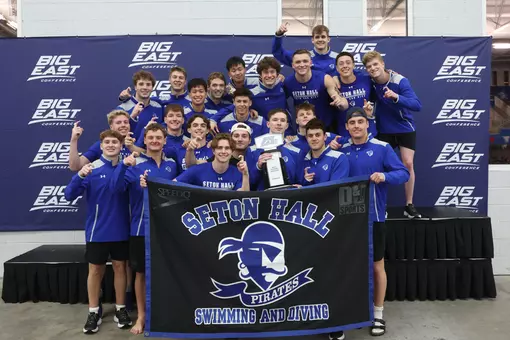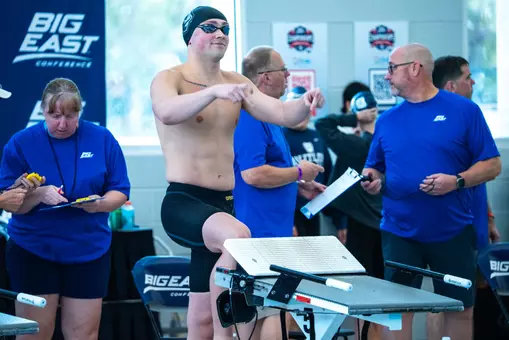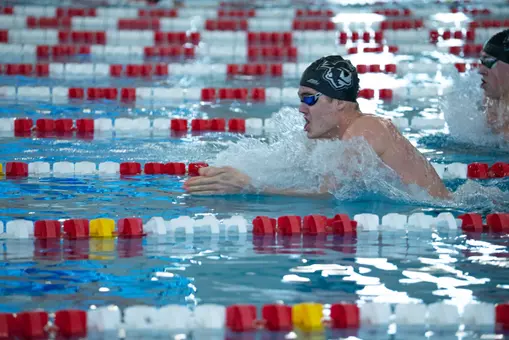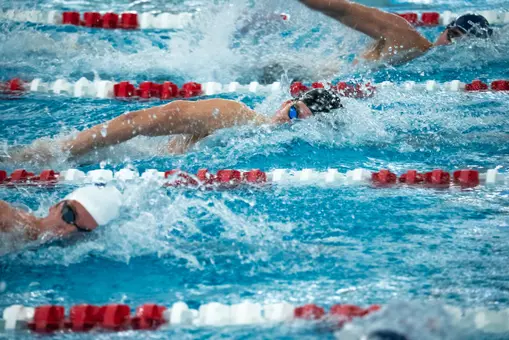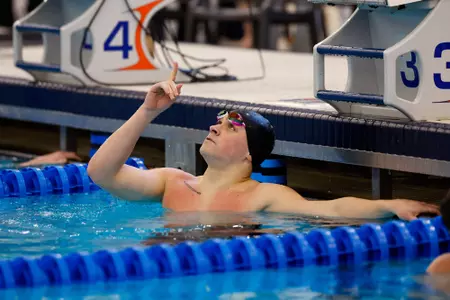
Full Reset: BIG EAST Champion Kevin Cary's Mental Health Journey to Success
11/6/2025 11:00:00 AM | Men's Swimming and Diving, Pride Excellence, H.A.L.L. Program
The words "Hazard Zet Forward," which loosely translate to "whatever the peril, ever forward," are the Seton Hall motto that can be found on the university's crest. That motto can also be found tattooed on the chest of Seton Hall men's swimming senior Kevin Cary. For Cary, that motto became his personal mantra over the last year and a half, helping him find success both in and outside the pool. Among that list of triumphs sits multiple school records, BIG EAST relay titles and an individual BIG EAST title in his signature event, the 200 freestyle. As his senior campaign began, Cary's success story can largely be attributed to his relationship with the 200 freestyle, a focus on mental health, and the phrase that has become a rallying cry for him.
For his entire career, the 200 freestyle has been Kevin Cary's calling card. By the end of his senior year, he won the event at the National Catholic Championship and also finished third in it at the YMCA Short Course Nationals. "It was the marquee event I was recruited for," he said. In his freshman year, that proved to be true, finishing second in the event's 2023 BIG EAST Championship final. Despite that early success, he began to question himself and his process during his sophomore year. "My freshman year, it slowly began to creep into my mind that I had to work a lot harder if I wanted to get faster," Cary cited. "My sophomore year was underwhelming because I was not trusting my training." Despite a strong start, a case of the flu derailed his 2024 BIG EAST campaign, sending him into what he himself called one of the lowest points of his life. Yet, the bottom would quickly drop even farther in less than two months.
When he returned home for the summer, mere months after suffering from the flu, Cary caught mono. For over a month, he was unable to engage in any physical activity except walking. Then, at his lowest, both athletically and mentally, it became a chance for introspection for Cary. "I really had to ask myself, 'What am I doing here?' he shared. "What else do I really need to do to be better?" After reflection, he realized this – he felt he was selfish. "I thought that I really only saw the goodness in me," Cary cited. In his struggle to be a good person, he realized he was not meeting the mark. Sitting in his room, unable to do anything but meditate and reevaluate, he had found himself once again. At the same time, he found a cause that would help him achieve his new mission.
That mission also led to the "Hazard Ze Forward" tattoo. During that recovery, Cary realized that this motto meant more to him than just words. It was one of the final physical acts in his process of self-realization. In his mind, those words on his chest will never be a regret. "It's something that will forever stick with me," Cary shared. "Not only physically, but also a part of who I am."
Amid this confluence of chaos, Cary applied to be campus captain, the equivalent of club president, for Seton Hall's The Hidden Opponent (THO) chapter. THO is a nonprofit organization dedicated to promoting athlete mental health advocacy, education, and support. Although he was not selected for the role that year, Cary's commitment to the organization's mission grew as he underwent his own personal reevaluation. In Cary's mind, the mental health of a student athlete is everything. "It's everything that I do as an athlete on a day-in, day-out basis," the senior said. "You have your goals and pressure from an athletic perspective, practice obligations, schoolwork, and, on top of all that, you have your personal life." In Cary's view, that mental load continually increases, making mental health management even more critical, especially among swimmers.
"Despite it being a team sport for scoring purposes," Cary shared, "Swimming is inherently an individual sport to a large degree." At its core, swimming is both the athlete versus their opponent and their own ghost time. For Cary, being a good swimmer also means being able to control and manage one's mental health. "If I'm not in the correct mental state when I step up to those blocks," Cary stated, "I might as well not even dive in the pool. Swimming is 90% thinking and 10% actually being physically swimming the race." That battle reminded him of an allegory his coaches told him about trying to swim with a backpack.
"A swimmer has their suit on, their goggles and everything else," the senior mused. "But they have a backpack for some reason. They then walk up, swim their race and obviously do terribly because they're wearing an entire backpack. But that's just the first heat. They then look back and there's another heat of other people with either a ton of backpacks and some with none." For Cary, ditching that backpack, dumping all that weight at the pool door, became essential to personal and athletic rebirth in his junior season.
After removing his pack, Cary surged in the pool, collecting weekly BIG EAST awards and putting up conference-leading times. By the time he arrived in snowy, cold Geneva, Ohio, for the BIG EAST Championships, he was not only confident in himself, but mentally in the best place he had been. "For me, it was time to open the floodgates and have fun because that's the bottom line," he shared. "If you're not having fun, if you're not remembering why you chose to do the sport, you're not going to really enjoy it at the end of the day."
During those five days in Ohio, Cary enjoyed every minute of it, collecting two relay titles and, most importantly, winning the 200 freestyle title. As he sat leaning on the edge of the pool at the end of the race, it was clear how much that win meant. "I'm a heart-on-my-sleeve type of guy," Cary shared. Yet, after touching the wall, there was no big celebration, no grandiose statement of victory. He was quiet, controlled and self-reflective. It was a moment he had earned after hard work, and he was soaking it all in. Yet, his journey still had another chapter to come.

Returning for his senior season, despite having a BIG EAST title, Cary was tasked with a new level of leadership – the title of THO Campus Captain. As campus captain, he has already had moments that help break the stigma around athlete mental health. While tabling, he showcased the organization to curious students who were unaware of its existence. Other times, he helped non-athletes gain a new perspective on the life of a student-athlete. "When people see the word student athlete," Cary shard, "they think they have their lives together. They're probably getting a scholarship and in a better situation compared to the average person in college." His continued work to fight that idea and grow the chapter is only just beginning this year, but he has help from one of the most mental-health forward teams at Seton Hall.
Historically, both swimming and diving teams have been very committed to mental health, hosting one meet in conjunction with THO. Amid the generational shift among athletes, the focus on team mental health has become more critical. "My emphasis this year," he shared, "is that it's okay to voice your struggles." That focus has meant leaving himself available for teammates to discuss their struggles and allowing everyone to be open with each other. So far this season, Cary believes that the team has done that. In his mind, it's not only a culture shift, but also a modernization of athletics.
"This would be completely unheard of 10 years ago," he shared. "I've heard so many different stories of people being told to 'man up' or 'just see it through. '" That premise, however, simply isn't the modern version of manning up in Cary's mind. "Now it's not that sense of manning up. It's that sense of, well, this version of manning up is assessing what's going on in your life and assessing what needs to be addressed versus what needs to be ignored." Approaching the midpoint of the season, Cary's teammates have approached him multiple times to talk. For him, there has been a peculiar mix of seniority and responsibility in these talks. However, Cary hopes these talks remind his teammates of one simple thing: "Being able to come in every day and work hard with people who have the same mindset as you, pushing towards something better than yourself, is so much more valuable than anything that you could ever win."
After three years at Seton Hall, Cary believes he has already made an indelible mark in South Orange through all the work he has done to shape the team's culture and the impact he has had on the people he has interacted with. "If I retired tomorrow, stopped going to school and completely fell off the face of the earth," he stated, "I know that I've made this place better. For me, I believe every single day and every single thing that I do during it, I'm able to make things better than they were before." For him, it could be the team culture, his work with THO or even as part of the executive board of the Sports Management and Analytics Club.
In Cary's mind, all his work serves one singular goal. "I want to spend my life helping people," he stated. "No matter if it's holding a door for somebody or eventually making a company and making an entire company based on helping people. I don't know where I'm going to fall between that, but if I can fall somewhere between that, I think my life will be as great as I want it to be."
As the final figures start being placed on the tableau of his Seton Hall story in the coming months, Cary wonders what the full image of his time here will look like when it's all over to others. However, when asked for an introspective look, he knows exactly how he'll feel about everything come graduation. Invoking the words of the late Robin Williams, he stated, "I don't know how much value I have in this universe, but I know I made a couple more people happier than with me than I would have been without me. As long as I know that I'm as rich as I'll ever be."
For his entire career, the 200 freestyle has been Kevin Cary's calling card. By the end of his senior year, he won the event at the National Catholic Championship and also finished third in it at the YMCA Short Course Nationals. "It was the marquee event I was recruited for," he said. In his freshman year, that proved to be true, finishing second in the event's 2023 BIG EAST Championship final. Despite that early success, he began to question himself and his process during his sophomore year. "My freshman year, it slowly began to creep into my mind that I had to work a lot harder if I wanted to get faster," Cary cited. "My sophomore year was underwhelming because I was not trusting my training." Despite a strong start, a case of the flu derailed his 2024 BIG EAST campaign, sending him into what he himself called one of the lowest points of his life. Yet, the bottom would quickly drop even farther in less than two months.
When he returned home for the summer, mere months after suffering from the flu, Cary caught mono. For over a month, he was unable to engage in any physical activity except walking. Then, at his lowest, both athletically and mentally, it became a chance for introspection for Cary. "I really had to ask myself, 'What am I doing here?' he shared. "What else do I really need to do to be better?" After reflection, he realized this – he felt he was selfish. "I thought that I really only saw the goodness in me," Cary cited. In his struggle to be a good person, he realized he was not meeting the mark. Sitting in his room, unable to do anything but meditate and reevaluate, he had found himself once again. At the same time, he found a cause that would help him achieve his new mission.
That mission also led to the "Hazard Ze Forward" tattoo. During that recovery, Cary realized that this motto meant more to him than just words. It was one of the final physical acts in his process of self-realization. In his mind, those words on his chest will never be a regret. "It's something that will forever stick with me," Cary shared. "Not only physically, but also a part of who I am."
Amid this confluence of chaos, Cary applied to be campus captain, the equivalent of club president, for Seton Hall's The Hidden Opponent (THO) chapter. THO is a nonprofit organization dedicated to promoting athlete mental health advocacy, education, and support. Although he was not selected for the role that year, Cary's commitment to the organization's mission grew as he underwent his own personal reevaluation. In Cary's mind, the mental health of a student athlete is everything. "It's everything that I do as an athlete on a day-in, day-out basis," the senior said. "You have your goals and pressure from an athletic perspective, practice obligations, schoolwork, and, on top of all that, you have your personal life." In Cary's view, that mental load continually increases, making mental health management even more critical, especially among swimmers.
"Despite it being a team sport for scoring purposes," Cary shared, "Swimming is inherently an individual sport to a large degree." At its core, swimming is both the athlete versus their opponent and their own ghost time. For Cary, being a good swimmer also means being able to control and manage one's mental health. "If I'm not in the correct mental state when I step up to those blocks," Cary stated, "I might as well not even dive in the pool. Swimming is 90% thinking and 10% actually being physically swimming the race." That battle reminded him of an allegory his coaches told him about trying to swim with a backpack.
"A swimmer has their suit on, their goggles and everything else," the senior mused. "But they have a backpack for some reason. They then walk up, swim their race and obviously do terribly because they're wearing an entire backpack. But that's just the first heat. They then look back and there's another heat of other people with either a ton of backpacks and some with none." For Cary, ditching that backpack, dumping all that weight at the pool door, became essential to personal and athletic rebirth in his junior season.
After removing his pack, Cary surged in the pool, collecting weekly BIG EAST awards and putting up conference-leading times. By the time he arrived in snowy, cold Geneva, Ohio, for the BIG EAST Championships, he was not only confident in himself, but mentally in the best place he had been. "For me, it was time to open the floodgates and have fun because that's the bottom line," he shared. "If you're not having fun, if you're not remembering why you chose to do the sport, you're not going to really enjoy it at the end of the day."
During those five days in Ohio, Cary enjoyed every minute of it, collecting two relay titles and, most importantly, winning the 200 freestyle title. As he sat leaning on the edge of the pool at the end of the race, it was clear how much that win meant. "I'm a heart-on-my-sleeve type of guy," Cary shared. Yet, after touching the wall, there was no big celebration, no grandiose statement of victory. He was quiet, controlled and self-reflective. It was a moment he had earned after hard work, and he was soaking it all in. Yet, his journey still had another chapter to come.

Returning for his senior season, despite having a BIG EAST title, Cary was tasked with a new level of leadership – the title of THO Campus Captain. As campus captain, he has already had moments that help break the stigma around athlete mental health. While tabling, he showcased the organization to curious students who were unaware of its existence. Other times, he helped non-athletes gain a new perspective on the life of a student-athlete. "When people see the word student athlete," Cary shard, "they think they have their lives together. They're probably getting a scholarship and in a better situation compared to the average person in college." His continued work to fight that idea and grow the chapter is only just beginning this year, but he has help from one of the most mental-health forward teams at Seton Hall.
Historically, both swimming and diving teams have been very committed to mental health, hosting one meet in conjunction with THO. Amid the generational shift among athletes, the focus on team mental health has become more critical. "My emphasis this year," he shared, "is that it's okay to voice your struggles." That focus has meant leaving himself available for teammates to discuss their struggles and allowing everyone to be open with each other. So far this season, Cary believes that the team has done that. In his mind, it's not only a culture shift, but also a modernization of athletics.
"This would be completely unheard of 10 years ago," he shared. "I've heard so many different stories of people being told to 'man up' or 'just see it through. '" That premise, however, simply isn't the modern version of manning up in Cary's mind. "Now it's not that sense of manning up. It's that sense of, well, this version of manning up is assessing what's going on in your life and assessing what needs to be addressed versus what needs to be ignored." Approaching the midpoint of the season, Cary's teammates have approached him multiple times to talk. For him, there has been a peculiar mix of seniority and responsibility in these talks. However, Cary hopes these talks remind his teammates of one simple thing: "Being able to come in every day and work hard with people who have the same mindset as you, pushing towards something better than yourself, is so much more valuable than anything that you could ever win."
After three years at Seton Hall, Cary believes he has already made an indelible mark in South Orange through all the work he has done to shape the team's culture and the impact he has had on the people he has interacted with. "If I retired tomorrow, stopped going to school and completely fell off the face of the earth," he stated, "I know that I've made this place better. For me, I believe every single day and every single thing that I do during it, I'm able to make things better than they were before." For him, it could be the team culture, his work with THO or even as part of the executive board of the Sports Management and Analytics Club.
In Cary's mind, all his work serves one singular goal. "I want to spend my life helping people," he stated. "No matter if it's holding a door for somebody or eventually making a company and making an entire company based on helping people. I don't know where I'm going to fall between that, but if I can fall somewhere between that, I think my life will be as great as I want it to be."
As the final figures start being placed on the tableau of his Seton Hall story in the coming months, Cary wonders what the full image of his time here will look like when it's all over to others. However, when asked for an introspective look, he knows exactly how he'll feel about everything come graduation. Invoking the words of the late Robin Williams, he stated, "I don't know how much value I have in this universe, but I know I made a couple more people happier than with me than I would have been without me. As long as I know that I'm as rich as I'll ever be."
Players Mentioned
Dorothy Vilardo's 2026 Hall of Fame Intro Video
Tuesday, February 24
Jason Hernandez's 2026 Hall of Fame Intro Video
Tuesday, February 24
James Fetten's 2026 Hall of Fame Intro Video
Tuesday, February 24
Gloria Bradley's 2026 Hall of Fame Intro Video
Tuesday, February 24










